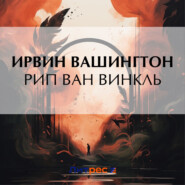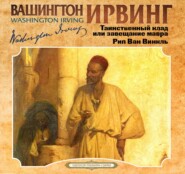По всем вопросам обращайтесь на: info@litportal.ru
(©) 2003-2024.
✖
Old Christmas
Настройки чтения
Размер шрифта
Высота строк
Поля
This song inspired the fat-headed old gentleman, who made several attempts to tell a rather broad story out of Joe Miller, that was pat to the purpose; but he always stuck in the middle, everybody recollecting the latter part excepting himself. The parson, too, began to show the effects of good cheer, having gradually settled down into a doze, and his wig sitting most suspiciously on one side. Just at this juncture we were summoned to the drawing-room, and, I suspect, at the private instigation of mine host, whose joviality seemed always tempered with a proper love of decorum.
After the dinner-table was removed, the hall was given up to the younger members of the family, who, prompted to all kind of noisy mirth by the Oxonian and Master Simon, made its old walls ring with their merriment, as they played at romping games. I delight in witnessing the gambols of children, and particularly at this happy holiday-season, and could not help stealing out of the drawing-room on hearing one of their peals of laughter. I found them at the game of blind-man's buff. Master Simon, who was the leader of their revels, and seemed on all occasions to fulfil the office of that ancient potentate, the Lord of Misrule,[14 - At Christmasse there was in the Kings's house, wheresoever hee was lodged, a lorde of misrule, or mayster of merry disportes; and the like had ye in the house of every nobleman of honour, or good worshippe, were he spirituall or temporall. – Stow.] was blinded in the midst of the hall. The little beings were as busy about him as the mock fairies about Falstaff; pinching him, plucking at the skirts of his coat, and tickling him with straws. One fine blue-eyed girl of about thirteen, with her flaxen hair all in beautiful confusion, her frolic face in a glow, her frock half torn off her shoulders, a complete picture of a romp, was the chief tormentor; and from the slyness with which Master Simon avoided the smaller game, and hemmed this wild little nymph in corners, and obliged her to jump shrieking over chairs, I suspected the rogue of being not a whit more blinded than was convenient.
When I returned to the drawing-room, I found the company seated around the fire, listening to the parson, who was deeply ensconced in a high-backed oaken chair, the work of some cunning artificer of yore, which had been brought from the library for his particular accommodation. From this venerable piece of furniture, with which his shadowy figure and dark weazen face so admirably accorded, he was dealing forth strange accounts of popular superstitions and legends of the surrounding country, with which he had become acquainted in the course of his antiquarian researches. I am half inclined to think that the old gentleman was himself somewhat tinctured with superstition, as men are very apt to be who live a recluse and studious life in a sequestered part of the country, and pore over black-letter tracts, so often filled with the marvellous and supernatural. He gave us several anecdotes of the fancies of the neighbouring peasantry, concerning the effigy of the crusader which lay on the tomb by the church altar. As it was the only monument of the kind in that part of the country, it had always been regarded with feelings of superstition by the goodwives of the village. It was said to get up from the tomb and walk the rounds of the churchyard in stormy nights, particularly when it thundered; and one old woman, whose cottage bordered on the churchyard, had seen it, through the windows of the church, when the moon shone, slowly pacing up and down the aisles. It was the belief that some wrong had been left unredressed by the deceased, or some treasure hidden, which kept the spirit in a state of trouble and restlessness. Some talked of gold and jewels buried in the tomb, over which the spectre kept watch; and there was a story current of a sexton in old times who endeavoured to break his way to the coffin at night; but just as he reached it, received a violent blow from the marble hand of the effigy, which stretched him senseless on the pavement. These tales were often laughed at by some of the sturdier among the rustics, yet when night came on, there were many of the stoutest unbelievers that were shy of venturing alone in the footpath that led across the churchyard. From these and other anecdotes that followed, the crusader appeared to be the favourite hero of ghost stories throughout the vicinity. His picture, which hung up in the hall, was thought by the servants to have something supernatural about it; for they remarked that, in whatever part of the hall you went, the eyes of the warrior were still fixed on you. The old porter's wife, too, at the lodge, who had been born and brought up in the family, and was a great gossip among the maid servants, affirmed that in her young days she had often heard say that on Midsummer eve, when it is well known all kinds of ghosts, goblins, and fairies become visible and walk abroad, the crusader used to mount his horse, come down from his picture, ride about the house, down the avenue, and so to the church to visit the tomb; on which occasion the church door most civilly swung open of itself: not that he needed it; for he rode through closed gates and even stone walls, and had been seen by one of the dairymaids to pass between two bars of the great park gate, making himself as thin as a sheet of paper.
All these superstitions, I found, had been very much countenanced by the Squire, who, though not superstitious himself, was very fond of seeing others so. He listened to every goblin tale of the neighbouring gossips with infinite gravity, and held the porter's wife in high favour on account of her talent for the marvellous. He was himself a great reader of old legends and romances, and often lamented that he could not believe in them; for a superstitious person, he thought, must live in a kind of fairyland.
Whilst we were all attention to the parson's stories, our ears were suddenly assailed by a burst of heterogeneous sounds from the hall, in which was mingled something like the clang of rude minstrelsy, with the uproar of many small voices and girlish laughter. The door suddenly flew open, and a train came trooping into the room, that might almost have been mistaken for the breaking up of the court of Fairy. That indefatigable spirit, Master Simon, in the faithful discharge of his duties as Lord of Misrule, had conceived the idea of a Christmas mummery, or masking; and having called in to his assistance the Oxonian and the young officer, who were equally ripe for anything that should occasion romping and merriment, they had carried it into instant effect. The old housekeeper had been consulted; the antique clothes-presses and wardrobes rummaged and made to yield up the relics of finery that had not seen the light for several generations; the younger part of the company had been privately convened from the parlour and hall, and the whole had been bedizened out, into a burlesque imitation of an antique masque.[15 - Maskings or mummeries were favourite sports at Christmas in old times; and the wardrobes at halls and manor-houses were often laid under contribution to furnish dresses and fantastic disguisings. I strongly suspect Master Simon to have taken the idea of his from Ben Jonson's "Masque of Christmas."]
Master Simon led the van, as "Ancient Christmas," quaintly apparelled in a ruff, a short cloak, which had very much the aspect of one of the old housekeeper's petticoats, and a hat that might have served for a village steeple, and must indubitably have figured in the days of the Covenanters. From under this his nose curved boldly forth, flushed with a frost-bitten bloom, that seemed the very trophy of a December blast. He was accompanied by the blue-eyed romp, dished up as "Dame Mince-Pie," in the venerable magnificence of faded brocade, long stomacher, peaked hat, and high-heeled shoes. The young officer appeared as Robin Hood, in a sporting dress of Kendal green and a foraging cap with a gold tassel. The costume, to be sure, did not bear testimony to deep research, and there was an evident eye to the picturesque, natural to a young gallant in the presence of his mistress. The fair Julia hung on his arm in a pretty rustic dress, as "Maid Marian." The rest of the train had been metamorphosed in various ways; the girls trussed up in the finery of the ancient belles of the Bracebridge line, and the striplings bewhiskered with burnt cork, and gravely clad in broad skirts, hanging sleeves, and full-bottomed wigs, to represent the characters of Roast Beef, Plum Pudding, and other worthies celebrated in ancient maskings. The whole was under the control of the Oxonian, in the appropriate character of Misrule; and I observed that he exercised rather a mischievous sway with his wand over the smaller personages of the pageant.
The irruption of this motley crew, with beat of drum, according to ancient custom, was the consummation of uproar and merriment. Master Simon covered himself with glory by the stateliness with which, as Ancient Christmas, he walked a minuet with the peerless, though giggling, Dame Mince-Pie. It was followed by a dance of all the characters, which, from its medley of costumes, seemed as though the old family portraits had skipped down from their frames to join in the sport. Different centuries were figuring at cross hands and right and left; the dark ages were cutting pirouettes and rigadoons; and the days of Queen Bess jigging merrily down the middle, through a line of succeeding generations.
The worthy Squire contemplated these fantastic sports, and this resurrection of his old wardrobe, with the simple relish of childish delight. He stood chuckling and rubbing his hands, and scarcely hearing a word the parson said, notwithstanding that the latter was discoursing most authentically on the ancient and stately dance at the Paon, or Peacock, from which he conceived the minuet to be derived.[16 - Sir John Hawkins, speaking of the dance called the Pavon, from pavo, a peacock, says: "It is a grave and majestic dance; the method of dancing it anciently was by gentlemen dressed with caps and swords, by those of the long robe in their gowns, by the peers in their mantles, and by the ladies in gowns with long trains, the motion whereof, in dancing, resembled that of a peacock." – History of Music.] For my part, I was in a continual excitement, from the varied scenes of whim and innocent gaiety passing before me. It was inspiring to see wild-eyed frolic and warm-hearted hospitality breaking out from among the chills and glooms of winter, and old age throwing off his apathy, and catching once more the freshness of youthful enjoyment. I felt also an interest in the scene, from the consideration that these fleeting customs were posting fast into oblivion, and that this was, perhaps, the only family in England in which the whole of them were still punctiliously observed. There was a quaintness, too, mingled with all this revelry that gave it a peculiar zest; it was suited to the time and place; and as the old Manor House almost reeled with mirth and wassail, it seemed echoing back the joviality of long-departed years.
But enough of Christmas and its gambols; it is time for me to pause in this garrulity. Methinks I hear the questions asked by my graver readers, "To what purpose is all this? – how is the world to be made wiser by this talk?" Alas! is there not wisdom enough extant for the instruction of the world? And if not, are there not thousands of abler pens labouring for its improvement? – It is so much pleasanter to please than to instruct – to play the companion rather than the preceptor.
What, after all, is the mite of wisdom that I could throw into the mass of knowledge? or how am I sure that my sagest deductions may be safe guides for the opinions of others? But in writing to amuse, if I fail, the only evil is my own disappointment. If, however, I can by any lucky chance, in these days of evil, rub out one wrinkle from the brow of care, or beguile the heavy heart of one moment of sorrow; if I can now and then penetrate through the gathering film of misanthropy, prompt a benevolent view of human nature, and make my reader more in good humour with his fellow beings and himself, surely, surely, I shall not then have written entirely in vain.
THE END
notes
1
Poor Robin's Almanack, 1684.
2
Peacham's "Complete Gentleman," 1622.
3
The misletoe is still hung up in farmhouses and kitchens at Christmas; and the young men have the privilege of kissing the girls under it, plucking each time a berry from the bush. When the berries are all plucked, the privilege ceases.
4
The Yule-clog is a great log of wood, sometimes the root of a tree, brought into the house with great ceremony, on Christmas eve, laid in the fireplace, and lighted with the brand of last year's clog. While it lasted there was great drinking, singing, and telling of tales. Sometimes it was accompanied by Christmas candles, but in the cottages the only light was from the ruddy blaze of the great wood fire. The Yule-clog was to burn all night; if it went out, it was considered a sign of ill luck.
Herrick mentions it in one of his songs:
"Come, bring with a noise
My merrie, merrie boyes,
The Christmas log to the firing:
While my good dame, she
Bids ye all be free,
And drink to your hearts' desiring."
The Yule-clog is still burnt in many farmhouses and kitchens in England, particularly in the north, and there are several superstitions connected with it among the peasantry. If a squinting person come to the house while it is burning, or a person barefooted, it is considered an ill omen. The brand remaining from the Yule-clog is carefully put away to light the next year's Christmas fire.
5
From the Flying Eagle, a small gazette, published December 24, 1652: "The House spent much time this day about the business of the Navy, for settling the affairs at sea; and before they rose, were presented with a terrible remonstrance against Christmas day, grounded upon divine Scriptures, 2 Cor. v. 16; 1 Cor. xv. 14, 17; and in honour of the Lord's Day, grounded upon these Scriptures, John xx. I; Rev. i. 10; Psalm cxviii. 24; Lev. xxiii. 7, 11; Mark xvi. 8; Psalm lxxxiv. 10, in which Christmas is called Anti-Christ's masse, and those Mass-mongers and Papists who observe it, etc. In consequence of which Parliament spent some time in consultation about the abolition of Christmas day, passed orders to that effect, and resolved to sit on the following day, which was commonly called Christmas day."
6
"Ule! Ule!
Three puddings in a pule;
Crack nuts and cry ule!"
7
An English gentleman at the opening of the great day, i. e. on Christmas day in the morning, had all his tenants and neighbours enter his hall by daybreak. The strong beer was broached, and the black jacks went plentifully about with toast, sugar, nutmeg, and good Cheshire cheese. The hackin (the great sausage) must be boiled by daybreak, or else two young men must take the maiden (i.e. the cook) by the arms and run her round the market-place till she is shamed of her laziness. – Round about our Sea-coal Fire.
8
Sir John Suckling.
9
The old ceremony of serving up the boar's head on Christmas day is still observed in the hall of Queen's College, Oxford. I was favoured by the parson with a copy of the carol as now sung, and as it may be acceptable to such of my readers as are curious in these grave and learned matters, I give it entire.
"The boar's head in hand bear I,
Bedeck'd with bays and rosemary;
And I pray you, my masters, be merry,
Quot estia in convivio.
Caput apri defero
Reddens laudes Domino.
"The boar's head, as I understand,
Is the rarest dish in all this land,
Which thus bedeck'd with a gay garland
Let us servire cantico.
Caput apri defero, etc.
"Our Steward hath provided this
In honour of the King of Bliss,
Which on this day to be served is
In Reginensi Atrio.
Caput apri defero,"
Etc., etc., etc.
10
The peacock was anciently in great demand for stately entertainments. Sometimes it was made into a pie, at one end of which the head appeared above the crust in all its plumage, with the beak richly gilt; at the other end the tail was displayed. Such pies were served up at the solemn banquets of chivalry, when knights-errant pledged themselves to undertake any perilous enterprise; whence came the ancient oath, used by Justice Shallow, "by cock and pie."
The peacock was also an important dish for the Christmas feast; and Massinger, in his "City Madam," gives some idea of the extravagance with which this, as well as other dishes, was prepared for the gorgeous revels of the olden times:
"Men may talk of country Christmasses, Their thirty pound butter'd eggs, their pies of carps' tongues: Their pheasants drench'd with ambergris; the carcases of three fat wethers bruised for gravy, to make sauce for a single peacock!"

















